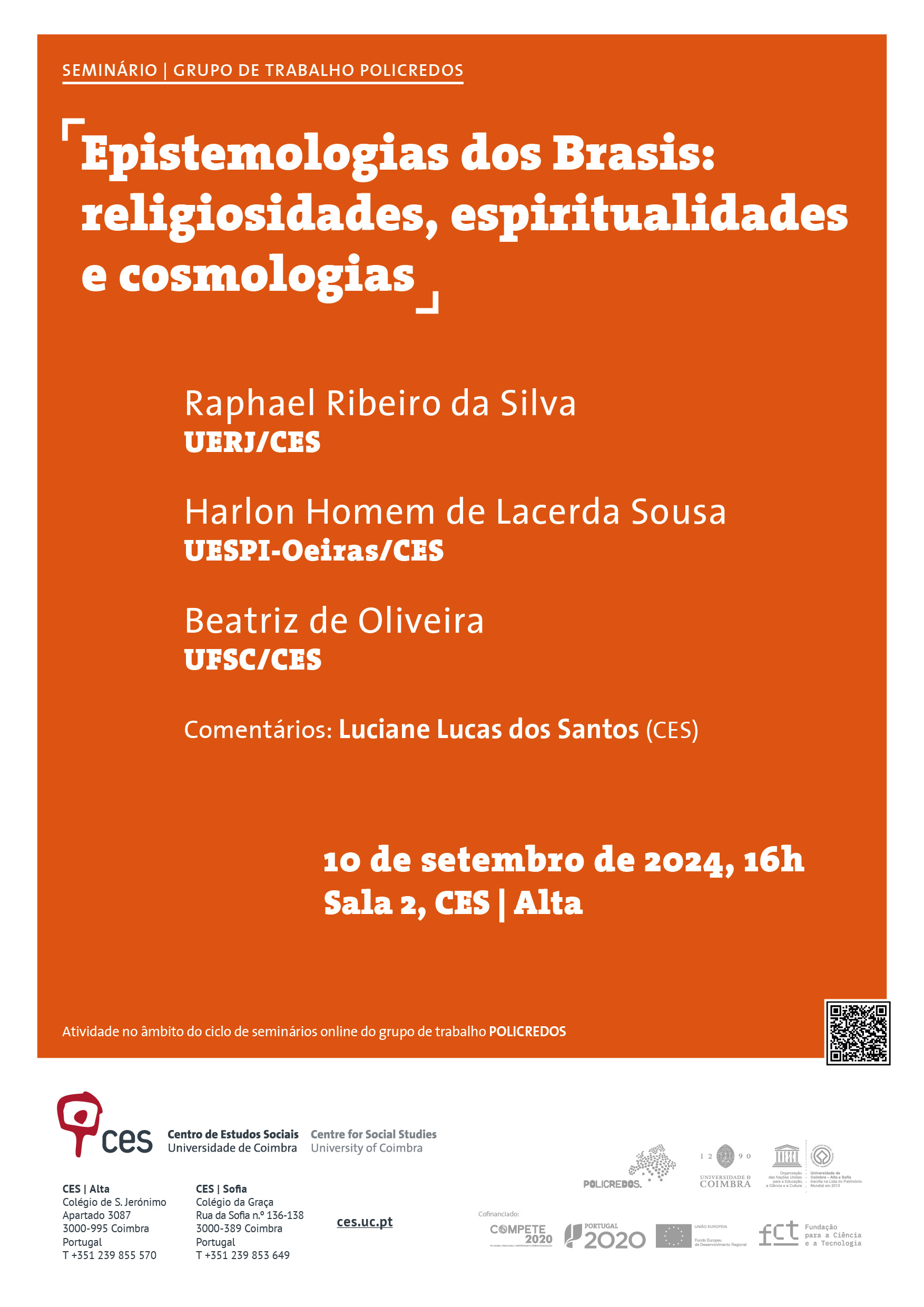SEMINAR | POLICREDOS WORKING GROUP
Epistemologies of Brazils: religiosities, spiritualities and cosmologies
September 10, 2024, 16h00
Room 1, CES | Alta
This seminar aims to discuss on different fronts the dimensions of Brazil as a space for the production of knowledges, especially in the field of religiosities, spiritualities and cosmologies. In this sense, it will cover multiple artistic languages, as well as ethical and political perspectives. The focus of the debate will be on the many Brazils of the indigenous territories, in the form of beliefs, practices and language management, the Africas that reside in the Umbanda and Candomblé terreiros, as well as the fields of quilombist, counter-colonial and amefrican thought.
Presentations by Raphael Ribeiro da Silva (UERJ/CES), Harlon Homem de Lacerda Sousa (UESPI-Oeiras/CES) and Beatriz de Oliveira (UFSC/CES).
Comments: Luciane Lucas dos Santos (CES)
Programme
16h - For an ethics of Orixality: aesthetic and epistemological perspectives referenced in Brazilian popular philosophy and an ancestral ethics in Africas-Brazils - Raphael Ribeiro da Silva (UERJ/CES)
This research comprises some aesthetic, cultural and ethical codes of Brazilian culture, more specifically those that surround a geopolitics of Afro-diasporic religiosities and popular thought, which in turn are considered simultaneously. In dialogue with Brazilian popular philosophy (Haddock-Lobo, 2020) and other fields of knowledge, we propose an ethical perspective crossed by multiple artistic languages centred on the terreiro communities. What we call Orixality, as a concept and structuring category, refers to an ethical-aesthetic-political space, structuring the process of building cultural and ethical-cosmogonic identities and agencies in contemporary times.
She/They. Raphael Ribeiro da Silva is a PhD candidate in the Postgraduate Programme in Bioethics, Applied Ethics and Collective Health at UERJ, visiting doctoral student at the Centre for Social Studies, University of Coimbra (CES/UC). She holds a Master's degree in Literature from PUC Rio (2020) and a Bachelor's degree in Media Studies (2017) from the Department of Cultural and Media Studies at the Fluminense Federal University (UFF).
16:20 - Literature and emancipation: cosmologies - Harlon Homem de Lacerda Sousa (UESPI-Oeiras/CES)
Antonio Bispo dos Santos' notion of cosmology is constructed in opposition to the notion of cosmophobia. Cosmology, therefore, is the way of being and living that integrates humanity, spirituality and nature as an organic and inextricable whole. Cosmophobia is the need to separate and rationalise every sector of human life, privileging the visible and the material. Thus, based on the counter-colonial thinking of Nego Bispo and the amefrican thinking of Lélia Gonzalez, we have constructed a set of cosmological reflections on literature and oral reading (Leda Maria Martins) as a performative and expressive tool for thematic, epistemological, methodological and political emancipation. These reflections are also supported by the knowledge accumulated by the epistemologies of the South and by decolonial thinking in terms of re-dimensioning the categories of thought and science that permeate Eurocentric theories of literature and orality.
Harlon Homem de Lacerda Sousa is a lecturer at the State University of Piauí, in the Languages/Portuguese course at the Professor Possidônio Queiroz Campus in the city of Oeiras/PI. He is a post-doctoral researcher at the Centre for Social Studies, University of Coimbra, supervised by Professor Dr Patrícia Vieira. PhD in Literature from the Federal University of Ceará (UFC) with the thesis ‘As Arquitetônicas Sertanejas da Ficção de João Guimarães Rosa’ (2018). Master's in Literature from the Federal University of Paraíba (UFPB). He studies epistemologies of the South, literary theory, narrative and Brazilian literature.
16:40 - Language(s) and spirituality: cosmology of connections - Beatriz de Oliveira (UFSC/CES)
This research is based on an ethnographic study in a Mbyá Guarani indigenous community. It is a research proposal that seeks to understand how different languages emerge in their contexts of use and what this reveals about local spirituality/religiosity. Based on decolonial studies and Epistemologies of the South, we intend to break with modern Western linguistic approaches based on processes of language invention and naming (Makoni; Pennycook, 2015). We realise that in this network of spiritual associations there are multiple agents (human and non-human) evoked through languages.
Beatriz de Oliveira is a researcher in the Critical Language Policies and Linguistic Rights Research Group (CNPq/Brazil). She carries out research in the area of Language Policy, with an emphasis on indigenous languages. She is a PhD student in the Postgraduate Programme in Linguistics at the Federal University of Santa Catarina. She is currently doing a doctoral internship at the Centre for Social Studies at the University of Coimbra (CES/UC). Master's in Linguistics from the Postgraduate Programme in Linguistics at the Federal University of Santa Catarina (UFSC). Graduated in Letters - Portuguese Language and Literature from the same university.


